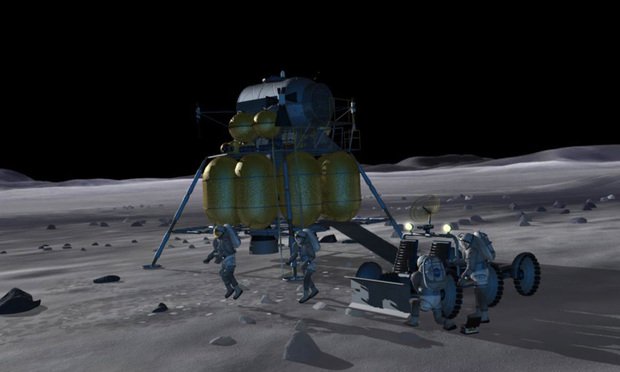Del. Judge Upholds $4M Award Over Spacecraft Tech Contract
U.S. District Chief Judge Leonard P. Stark of the District of Delaware on Monday declined to roll back the Jan. 12 verdict, which awarded Intuitive Machines cash and equity in Moon Express Inc. as a result of Moon Express' failure to complete work on the software underpinning its project.
October 16, 2018 at 06:42 PM
3 minute read
 Photo: Artist's concept by John Frassanito and Associates/NASA
Photo: Artist's concept by John Frassanito and Associates/NASA
A Delaware federal judge has upheld a $4.1 million jury verdict in favor of a Houston-based engineering startup in a breach-of-contract suit over technology for a spacecraft and lunar lander vehicle capable of transporting experiments from the International Space Station.
U.S. District Chief Judge Leonard P. Stark of the District of Delaware on Monday declined to roll back the Jan. 12 verdict, which awarded Intuitive Machines cash and equity in Moon Express Inc. as a result of Moon Express' failure to complete work on the software underpinning its project.
According to court documents, Moon Express, which is based at Cape Canaveral Air Force Station in Florida, had hired Intuitive machines to write flight software and build a terrestrial return vehicle for its commercial lunar transportation business.
The company sued in 2016, after the partnership broke down, alleging that Intuitive Machines had lied about its ability to meet its obligations under two contracts. Intuitive Machines countered that it had met its contractual duties and had only stopped work because Moon Express had failed to make agreed-upon payments.
Following a five-day trial, a Wilmington jury sided with Intuitive Machines, awarding damages of $1.25 million in cash and $2.25 million in Moon Express equity for breaches of one contract. The panel also awarded $732,000 on another contract that was at issue in the suit.
Moon Express moved for a new trial with respect to both contracts. The company argued that the jury had overlooked evidence that Intuitive Machines had deliberately breached its obligations by refusing to deliver software that it had already developed, nixing Moon Express' duty to provide a test vehicle to Intuitive Machines to perform a crucial “tethered test,” which would have triggered a payment under the one of the contracts.
However, Stark noted that Moon Express had taken the opposite position at trial, telling the jury that Intuitive Machines needed to perform the test on a test vehicle in order to get paid.
“[Moon Express'] post-trial about-face is striking,” Stark wrote Monday in a 20-page memorandum order.
Stark said that the jury had heard testimony from Moon Express' own CEO, Bob Richards, that the company had never provided a test vehicle and had no intention to, because it was contemplating a new vehicle design and had decided that a tethered test was no longer suitable for Intuitive Machines' software.
“While the jury was not compelled to credit all of [Intuitive Machines'] evidence, it was free to do so,” Stark wrote. “In the court's view, there was plainly enough evidence to support the jury's finding.”
Stark's ruling Monday also granted Intuitive Machine's request for attorney fees and denied Moon Express' request that the judgment be stayed pending Intuitive's request to have the equity portion of the verdict converted to cash. Both sides are set to argue the motion early next year.
Attorneys for both sides were not immediately available Tuesday afternoon to comment.
Moon Express is represented by R. Craig Martin, Ilana H. Eisenstein, Michael P. O'Day and Marc A. Silverman of DLA Piper.
Intuitive Machines is represented by David J. Wolfsohn, Oderah C. Nwaeze and Kelly K. Huff of Duane Morris.
The case, in the U.S. District Court for the District of Delaware, was captioned Moon Express v. Intuitive Machines.
This content has been archived. It is available through our partners, LexisNexis® and Bloomberg Law.
To view this content, please continue to their sites.
Not a Lexis Subscriber?
Subscribe Now
Not a Bloomberg Law Subscriber?
Subscribe Now
NOT FOR REPRINT
© 2025 ALM Global, LLC, All Rights Reserved. Request academic re-use from www.copyright.com. All other uses, submit a request to [email protected]. For more information visit Asset & Logo Licensing.
You Might Like
View All
Zoom Faces Intellectual Property Suit Over AI-Based Augmented Video Conferencing
3 minute read
Etsy App Infringes on Storage, Retrieval Patents, New Suit Claims


Law Firm Sued for $35 Million Over Alleged Role in Acquisition Deal Collapse
3 minute readTrending Stories
- 1Arguing Class Actions: With Friends Like These...
- 2How Some Elite Law Firms Are Growing Equity Partner Ranks Faster Than Others
- 3Fried Frank Partner Leaves for Paul Hastings to Start Tech Transactions Practice
- 4Stradley Ronon Welcomes Insurance Team From Mintz
- 5Weil Adds Acting Director of SEC Enforcement, Continuing Government Hiring Streak
Who Got The Work
J. Brugh Lower of Gibbons has entered an appearance for industrial equipment supplier Devco Corporation in a pending trademark infringement lawsuit. The suit, accusing the defendant of selling knock-off Graco products, was filed Dec. 18 in New Jersey District Court by Rivkin Radler on behalf of Graco Inc. and Graco Minnesota. The case, assigned to U.S. District Judge Zahid N. Quraishi, is 3:24-cv-11294, Graco Inc. et al v. Devco Corporation.
Who Got The Work
Rebecca Maller-Stein and Kent A. Yalowitz of Arnold & Porter Kaye Scholer have entered their appearances for Hanaco Venture Capital and its executives, Lior Prosor and David Frankel, in a pending securities lawsuit. The action, filed on Dec. 24 in New York Southern District Court by Zell, Aron & Co. on behalf of Goldeneye Advisors, accuses the defendants of negligently and fraudulently managing the plaintiff's $1 million investment. The case, assigned to U.S. District Judge Vernon S. Broderick, is 1:24-cv-09918, Goldeneye Advisors, LLC v. Hanaco Venture Capital, Ltd. et al.
Who Got The Work
Attorneys from A&O Shearman has stepped in as defense counsel for Toronto-Dominion Bank and other defendants in a pending securities class action. The suit, filed Dec. 11 in New York Southern District Court by Bleichmar Fonti & Auld, accuses the defendants of concealing the bank's 'pervasive' deficiencies in regards to its compliance with the Bank Secrecy Act and the quality of its anti-money laundering controls. The case, assigned to U.S. District Judge Arun Subramanian, is 1:24-cv-09445, Gonzalez v. The Toronto-Dominion Bank et al.
Who Got The Work
Crown Castle International, a Pennsylvania company providing shared communications infrastructure, has turned to Luke D. Wolf of Gordon Rees Scully Mansukhani to fend off a pending breach-of-contract lawsuit. The court action, filed Nov. 25 in Michigan Eastern District Court by Hooper Hathaway PC on behalf of The Town Residences LLC, accuses Crown Castle of failing to transfer approximately $30,000 in utility payments from T-Mobile in breach of a roof-top lease and assignment agreement. The case, assigned to U.S. District Judge Susan K. Declercq, is 2:24-cv-13131, The Town Residences LLC v. T-Mobile US, Inc. et al.
Who Got The Work
Wilfred P. Coronato and Daniel M. Schwartz of McCarter & English have stepped in as defense counsel to Electrolux Home Products Inc. in a pending product liability lawsuit. The court action, filed Nov. 26 in New York Eastern District Court by Poulos Lopiccolo PC and Nagel Rice LLP on behalf of David Stern, alleges that the defendant's refrigerators’ drawers and shelving repeatedly break and fall apart within months after purchase. The case, assigned to U.S. District Judge Joan M. Azrack, is 2:24-cv-08204, Stern v. Electrolux Home Products, Inc.
Featured Firms
Law Offices of Gary Martin Hays & Associates, P.C.
(470) 294-1674
Law Offices of Mark E. Salomone
(857) 444-6468
Smith & Hassler
(713) 739-1250






